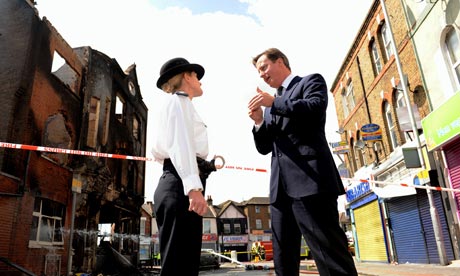By Peter Oborne Last updated: August 11th, 2011 in The Telegraph
David Cameron, Ed Miliband and the entire British political class came together yesterday to denounce the rioters. They were of course right to say that the actions of these looters, arsonists and muggers were abhorrent and criminal, and that the police should be given more support.
But there was also something very phony and hypocritical about all the shock and outrage expressed in parliament. MPs spoke about the week’s dreadful events as if they were nothing to do with them.
I cannot accept that this is the case. Indeed, I believe that the criminality in our streets cannot be dissociated from the moral disintegration in the highest ranks of modern British society. The last two decades have seen a terrifying decline in standards among the British governing elite. It has become acceptable for our politicians to lie and to cheat. An almost universal culture of selfishness and greed has grown up.
It is not just the feral youth of Tottenham who have forgotten they have duties as well as rights. So have the feral rich of Chelsea and Kensington. A few years ago, my wife and I went to a dinner party in a large house in west London. A security guard prowled along the street outside, and there was much talk of the “north-south divide”, which I took literally for a while until I realised that my hosts were facetiously referring to the difference between those who lived north and south of Kensington High Street.
Most of the people in this very expensive street were every bit as deracinated and cut off from the rest of Britain as the young, unemployed men and women who have caused such terrible damage over the last few days. For them, the repellent Financial Times magazine How to Spend It is a bible. I’d guess that few of them bother to pay British tax if they can avoid it, and that fewer still feel the sense of obligation to society that only a few decades ago came naturally to the wealthy and better off.
Yet we celebrate people who live empty lives like this. A few weeks ago, I noticed an item in a newspaper saying that the business tycoon Sir Richard Branson was thinking of moving his headquarters to Switzerland. This move was represented as a potential blow to the Chancellor of the Exchequer, George Osborne, because it meant less tax revenue.
I couldn’t help thinking that in a sane and decent world such a move would be a blow to Sir Richard, not the Chancellor. People would note that a prominent and wealthy businessman was avoiding British tax and think less of him. Instead, he has a knighthood and is widely feted. The same is true of the brilliant retailer Sir Philip Green. Sir Philip’s businesses could never survive but for Britain’s famous social and political stability, our transport system to shift his goods and our schools to educate his workers.
Yet Sir Philip, who a few years ago sent an extraordinary £1 billion dividend offshore, seems to have little intention of paying for much of this. Why does nobody get angry or hold him culpable? I know that he employs expensive tax lawyers and that everything he does is legal, but he surely faces ethical and moral questions just as much as does a young thug who breaks into one of Sir Philip’s shops and steals from it?
Our politicians – standing sanctimoniously on their hind legs in the Commons yesterday – are just as bad. They have shown themselves prepared to ignore common decency and, in some cases, to break the law. David Cameron is happy to have some of the worst offenders in his Cabinet. Take the example of Francis Maude, who is charged with tackling public sector waste – which trade unions say is a euphemism for waging war on low‑paid workers. Yet Mr Maude made tens of thousands of pounds by breaching the spirit, though not the law, surrounding MPs’ allowances.
A great deal has been made over the past few days of the greed of the rioters for consumer goods, not least by Rotherham MP Denis MacShane who accurately remarked, “What the looters wanted was for a few minutes to enter the world of Sloane Street consumption.” This from a man who notoriously claimed £5,900 for eight laptops. Of course, as an MP he obtained these laptops legally through his expenses.
Yesterday, the veteran Labour MP Gerald Kaufman asked the Prime Minister to consider how these rioters can be “reclaimed” by society. Yes, this is indeed the same Gerald Kaufman who submitted a claim for three months’ expenses totalling £14,301.60, which included £8,865 for a Bang & Olufsen television.
Or take the Salford MP Hazel Blears, who has been loudly calling for draconian action against the looters. I find it very hard to make any kind of ethical distinction between Blears’s expense cheating and tax avoidance, and the straight robbery carried out by the looters.
The Prime Minister showed no sign that he understood that something stank about yesterday’s Commons debate. He spoke of morality, but only as something which applies to the very poor: “We will restore a stronger sense of morality and responsibility – in every town, in every street and in every estate.” He appeared not to grasp that this should apply to the rich and powerful as well.
The tragic truth is that Mr Cameron is himself guilty of failing this test. It is scarcely six weeks since he jauntily turned up at the News International summer party, even though the media group was at the time subject to not one but two police investigations. Even more notoriously, he awarded a senior Downing Street job to the former News of the World editor Andy Coulson, even though he knew at the time that Coulson had resigned after criminal acts were committed under his editorship. The Prime Minister excused his wretched judgment by proclaiming that “everybody deserves a second chance”. It was very telling yesterday that he did not talk of second chances as he pledged exemplary punishment for the rioters and looters.
These double standards from Downing Street are symptomatic of widespread double standards at the very top of our society. It should be stressed that most people (including, I know, Telegraph readers) continue to believe in honesty, decency, hard work, and putting back into society at least as much as they take out.
But there are those who do not. Certainly, the so-called feral youth seem oblivious to decency and morality. But so are the venal rich and powerful – too many of our bankers, footballers, wealthy businessmen and politicians.
Of course, most of them are smart and wealthy enough to make sure that they obey the law. That cannot be said of the sad young men and women, without hope or aspiration, who have caused such mayhem and chaos over the past few days. But the rioters have this defence: they are just following the example set by senior and respected figures in society. Let’s bear in mind that many of the youths in our inner cities have never been trained in decent values. All they have ever known is barbarism. Our politicians and bankers, in sharp contrast, tend to have been to good schools and universities and to have been given every opportunity in life.
Something has gone horribly wrong in Britain. If we are ever to confront the problems which have been exposed in the past week, it is essential to bear in mind that they do not only exist in inner-city housing estates.
The culture of greed and impunity we are witnessing on our TV screens stretches right up into corporate boardrooms and the Cabinet. It embraces the police and large parts of our media. It is not just its damaged youth, but Britain itself that needs a moral reformation.
Christina Patterson: The Independent
Too many black men have been killed by the police. This is not the cause of these riots, but it's in the mix
Wednesday, 10 August 2011
August, historians will tell you, is a good time to start a war. And, boy, does this feel like a war. This feels, when you switch on the TV, and see footage of burning cars, and burning buildings, and of people jumping out of burning buildings, and of people too scared to walk down their street, and of dark silhouettes in helmets waving shields, and of dark silhouettes in hoodies waving iron bars, like the nearest to war most of us have been.
This feels, when you talk to friends, and find that they're staying in with their children all day, because the area outside their front door has been turned into something that looks as though a bomb has hit it, and when you talk to friends who do open their front door, and find a looter in a balaclava hiding in their garden, like the end of something, and the start of something else. It feels like the end of getting up in the morning, and knowing that you'll be able to go to work safely, and get home safely, and do your job safely when you're there.
For some of us, the only sign on our doorsteps was even more police cars screeching past than usual, and shops that closed early, and helicopters overhead. For my neighbours, down the road in Dalston, and down the road in Hackney, it wasn't. For the man, for example, who runs a pharmacy in Mare Street, and watched a group of teenagers try to trash his shop, which was, he said, "everything he had", and who pleaded with them not to, it must have felt like the end of everything he'd spent his whole life working to build up.
For the other shopkeepers in Mare Street, and the ones in Dalston, and the ones in Tottenham, and the ones in Brixton, who watched teenagers smash glass and fill their pockets with mobile phones, or jewellery, or grab trainers, or tracksuits, or even stagger under the weight of giant TVs, it must have felt as if one of the central pillars of their life was under threat.
And for the people who lost their homes, and all their possessions, and their children's toys, and every single photo of their children, which they will never, ever be able to get back, and who nearly lost their lives, and their children's lives, because someone thought it was a good laugh to throw a can of kerosene and a match, it must have felt as near as you get to losing your world, without losing your life.
This is what happens in a war. Wars start for a million different reasons, and the time to understand those reasons is not while the war is going on. They can start – even world wars can start – with a single gunshot. This one did. This one started with an old, old story, of a black man killed by police. It started when a woman wanted to know why four children would never see their father again. And when the police said nothing. And frustration turned, as it often does, and particularly in communities where there's a lot of frustration, to anger, and anger turned, as it often does, and particularly in communities where there are a lot of teenagers with not very much to do, to violence.
And it spread. Do we know if the boys, and young men, smashing windows, and trashing shops, and burning cars, and buses, and buildings, in Hackney, and Croydon, and Brixton, and telling passers-by that what they were doing was "fun", and that they were "trying to get their taxes back", knew about the shooting of the black man, or even cared? Do we know if they knew about the black teenager in Hackney who was stopped and searched by the police, and found to have nothing illegal on him?
We don't, and we can't. We don't, and can't, know why young men, and teenagers, and children as young as 10 suddenly decided that it was a good idea to do what everyone else was doing, which was to spread chaos, and violence, and fear. But we do know that when a tinderbox, or a car, or a carpet store, is set alight, this is what, throughout history, everywhere in the world, sometimes happens.
Race didn't cause these riots, but it played a part. Why else do you get three black men talking about them on
Newsnight, when you almost never see a black man talking about anything on Newsnight? And asked questions about "the black community", as if the people who had had their livelihoods destroyed would have the same views on anything as the 12-year-olds waving iron bars? And why else do you get people talking, as they are on newspaper websites, and radio phone-ins, about "thieving black scum"?
There is no excuse for wrecking people's livelihoods and lives. "She's working hard to make her business work," screamed a brave black woman at some of the rioters in Hackney, "and you lot want to burn it up, for what? To say you're warring, and you're 'bad man'? This is about a fucking man who got shot in Tottenham. This isn't about busting up the place. Get it real, black people. Get real!"
The woman was nearly in tears, and who wouldn't cry seeing their community destroyed, and who wouldn't cry knowing that this would be yet another excuse for people to associate black people with crime? The rioters weren't all black, of course. They were black, and mixed race, and white and wannabe black. They were people who are probably already in gangs, but who usually keep their violence to other gangs, but who, on Saturday, and Sunday, and Monday, and Tuesday, didn't. On Saturday, and Sunday, and Monday, and Tuesday, they discovered, perhaps for the first time outside their little world, the thrill of power.
There are 169 gangs in London. There are 22 in Hackney alone. These are people, often people who have grown up on estates where almost nobody works, often without fathers, and often without any qualifications, skills, or ambitions, who feel that the world has let them down. The guns and knives they carry make them feel that there's a tiny corner of the world they can control. And because of these boys – no more than 2,000 of them – who carry guns and knives, and because it takes more than reports on "institutional racism" to get rid of "institutional racism", you can hardly walk down a street, if you're black, without being stopped and searched.
Too many black men have been killed by the police. Too many black men and women have been treated like criminals when they're not. This is not the cause of these riots, but it's there in the mix, a mix where the key ingredient is feeling powerless. Cuts won't help. Growing unemployment won't help. Some investment, in youth services, and better schools, and mentoring schemes, might, but money alone isn't the answer.
It wasn't these children who created the culture that told them that what mattered was the brand of their trainers, or the glitter of their bling. It wasn't these children who created the culture that told them that their one hope of escape was hip hop, or fame. It wasn't these children who created the institutions of a country where all the black workers were in the canteens. We have, as a society, created this monster and, as a society, and like those people heading into the trouble spots with dustpans and brushes, we must pick up the pieces.
c.patterson@independent.co.uk; twitter.com/queenchristina_









